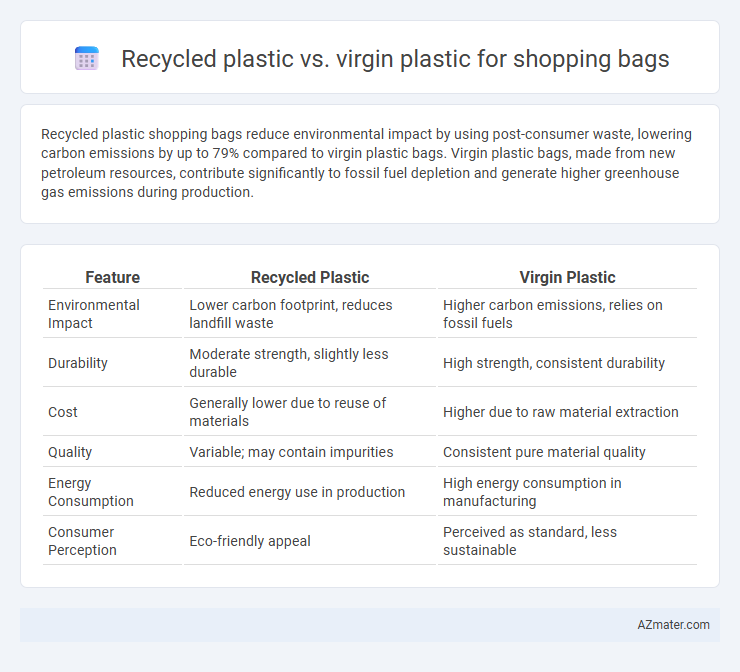Recycled plastic shopping bags reduce environmental impact by using post-consumer waste, lowering carbon emissions by up to 79% compared to virgin plastic bags. Virgin plastic bags, made from new petroleum resources, contribute significantly to fossil fuel depletion and generate higher greenhouse gas emissions during production.
Table of Comparison
| Feature | Recycled Plastic | Virgin Plastic |
|---|---|---|
| Environmental Impact | Lower carbon footprint, reduces landfill waste | Higher carbon emissions, relies on fossil fuels |
| Durability | Moderate strength, slightly less durable | High strength, consistent durability |
| Cost | Generally lower due to reuse of materials | Higher due to raw material extraction |
| Quality | Variable; may contain impurities | Consistent pure material quality |
| Energy Consumption | Reduced energy use in production | High energy consumption in manufacturing |
| Consumer Perception | Eco-friendly appeal | Perceived as standard, less sustainable |
Environmental Impact: Recycled vs Virgin Plastic Bags
Recycled plastic bags significantly reduce environmental impact by lowering greenhouse gas emissions and conserving non-renewable petroleum resources compared to virgin plastic bags made from raw fossil fuels. The production of recycled plastic bags generates less energy and decreases landfill waste, mitigating pollution and resource depletion. Choosing recycled plastic shopping bags supports a circular economy and reduces plastic pollution in oceans and ecosystems.
Resource Consumption in Plastic Bag Production
Recycled plastic shopping bags significantly reduce resource consumption compared to virgin plastic, saving up to 70% of energy and lowering water use during production. Virgin plastic bags require raw petrochemical extraction, intensifying fossil fuel depletion and greenhouse gas emissions. Utilizing recycled plastics for shopping bags supports circular economy principles by minimizing landfill waste and conserving non-renewable resources.
Carbon Footprint Comparison
Recycled plastic shopping bags have a significantly lower carbon footprint compared to virgin plastic bags, reducing emissions by up to 60% during production due to less energy-intensive raw material processing. Virgin plastic bags require extraction and refining of fossil fuels, leading to higher greenhouse gas emissions. Using recycled plastic supports waste reduction and contributes to a more sustainable lifecycle by minimizing carbon dioxide output from manufacturing to disposal.
Durability and Performance of Shopping Bags
Recycled plastic shopping bags often exhibit comparable durability and performance to virgin plastic bags due to advances in recycling technology that preserve material strength and flexibility. Virgin plastic bags typically offer consistent quality and higher tensile strength, making them more resistant to tearing under heavy loads. Both types can be engineered for optimal weight-bearing capacity and longevity, but recycled plastic bags contribute to sustainability without significantly compromising functional performance.
Cost Analysis: Recycled Plastic vs Virgin Plastic
Recycled plastic shopping bags typically cost 10-20% less to produce than virgin plastic bags due to lower raw material expenses and reduced energy consumption during manufacturing. Virgin plastic bags, made from non-renewable petroleum resources, carry higher long-term environmental costs and price volatility linked to oil market fluctuations. Evaluating lifecycle costs reveals recycled plastics offer economic benefits alongside environmental advantages, making them a cost-effective choice for sustainable shopping bag production.
Recycling Challenges and Opportunities
Recycled plastic shopping bags reduce environmental impact by reusing waste materials, but contamination and degradation of polymer quality pose significant recycling challenges. Virgin plastic offers consistent purity and durability optimal for manufacturing, yet relies on finite fossil fuel resources contributing to carbon emissions. Innovations in chemical recycling and improved sorting technologies present key opportunities to enhance recycled plastic quality, making it a more viable alternative for sustainable bag production.
Consumer Perceptions and Preferences
Consumer perceptions favor recycled plastic shopping bags for their environmental benefits and reduced carbon footprint, enhancing brand appeal among eco-conscious shoppers. However, preferences sometimes lean toward virgin plastic bags due to their perceived superior durability, strength, and clarity, impacting their usability for heavy or long-term use. Market trends indicate a growing shift toward recycled plastic as sustainability becomes a key driver in purchasing decisions.
Regulatory Policies Affecting Plastic Bags
Regulatory policies increasingly favor recycled plastic over virgin plastic for shopping bags due to environmental sustainability goals and waste reduction mandates. Many governments enforce bans or taxes on single-use virgin plastic bags, incentivizing the use of recycled-content alternatives that comply with extended producer responsibility (EPR) regulations. Compliance with such policies often requires a minimum percentage of recycled material in plastic bags to reduce carbon footprint and landfill waste.
Innovations in Sustainable Bag Materials
Recycled plastic shopping bags utilize post-consumer and post-industrial waste, reducing landfill impact and conserving petroleum resources compared to virgin plastic bags made from new fossil fuels. Innovations such as enhanced recycling technologies and the integration of biodegradable additives improve the durability and environmental profile of recycled plastic bags. Advanced manufacturing processes now enable higher-quality recycled polymers that rival virgin plastics in strength and flexibility, promoting greater adoption in sustainable retail packaging.
Future Trends: Towards a Circular Economy
Recycled plastic shopping bags significantly reduce plastic waste and carbon emissions compared to virgin plastic, aligning with the global shift towards a circular economy. Innovations in recycling technologies and increased government regulations are driving the adoption of recycled plastics, promoting closed-loop systems where materials are continuously reused. Future trends emphasize scalable recycling infrastructure and bio-based additives to enhance durability and sustainability in shopping bags.

Infographic: Recycled plastic vs Virgin plastic for Shopping bag
 azmater.com
azmater.com